- Home
- Devdutt Pattanaik
Pregnant King Page 3
Pregnant King Read online
Page 3
‘If my whole life has been decided for me, then why did Prajapati give me a heart? Why did he make me dream? Why does he bring music into my heart?’ His eyes betrayed his anguish. ‘When will I live my own life?’
Ahuka did not like his son’s whining. ‘After you repay your debts,’ he snapped. ‘That you exist means you are indebted to those who made your existence possible. That you have the fortune of being human, not a plant or animal, means you have another debt. That you are a man, not a woman, is indicative of yet another debt. Just ask your sister how lucky you are. That you are the eldest not the youngest is another debt. That you are my son, the son of a king, not the son of a priest or a potter, also indicates a debt. Debts are all around us. They bind us to the world and to each other, force us to live for others. Break the chain of obligations and you will unravel the fabric of society, my son. Remember, your destiny, whether you accept it or not, is nothing but your own debt, incurred by you consciously or unconsciously, either in this life or your past life. You must repay them. That is what being an Arya is all about. It is what dharma is all about. It is the noble thing to do.’
So many repayments. Repayments to one’s ancestors, to one’s family, one’s caste, one’s village, repayments to the Devas who reside in the sky, to Asuras beneath the earth, to the Apsaras in the rivers, to the Rishis who keep alive the wisdom of the Veda. ‘Will I ever sing the songs of my heart and walk freely by the riverside?’ asked Nabhaka.
‘You can always sing in the evening, when the sabha has concluded and you are free to be with your wives,’ said Shilavati softly, placing her hand on her brother’s shoulders.
‘And you sister, how will you compromise?’ said Nabhaka, shrugging her hand away, his voice harsh and angry. ‘How will you rule when they force you to become a wife?’ Nabhaka did not want to hurt his elder sister. But he wanted her to feel what he felt, the pain of dreams crushed on the altar of dharma. He saw tears well up in her eyes. She knew that just as a man’s destiny is bound to his lineage, a woman’s is bound to her body. Both are determined at birth and are immutable.
‘It is not compromise, brother,’ said Shilavati, holding back her tears. ‘It is sacrifice. Dharma is all about sacrifice so that the rest can thrive.’
Later that evening, as he rested on the swing with his two wives, chewing betel nut, Ahuka said, ‘She thinks clearly. She thinks deep. Life has spewed out a twisted fate for my daughter, given her a man’s head and a woman’s body.’
‘And what about your son’s fate?’ asked the senior queen, as she massaged the king’s forehead with warm coconut oil made fragrant with camphor.
‘He will be king.’
‘And that’s good?’
‘Of course,’ said Ahuka, looking up at his wife, surprised by her comment. ‘Isn’t it?’
‘For whom, Arya?’
Ahuka’s heart ached for his children. The son who did not want to be king and the daughter who would not be allowed to be king. The account books of Yama, dark and dispassionate god of death and rebirth, shaped the destiny of his children. But Kama, the reckless god of life and love, had raised his sugarcane bow and struck both their hearts with dangerous desires. Yama, who relentlessly pursued all living creatures on his buffalo, was unconcerned. The children had to repay the debts whether they liked it or not. His noose was tight around their soul. He would hook them ruthlessly if they strayed. Kama meanwhile, flying on his parrot, accompanied by an entourage of bees and butterflies, would continue releasing the flower-tipped arrows, indifferent to the consequences, combating indignation and outrage with his charm. Like all children of Prajapati, Ahuka realized his children would also have to live their lives restrained by the noose of Yama and spurred by the arrows of Kama.
‘Maybe I should send her to the Acharyas with her brother to be instructed formally on the dharma-shastras.’
‘No,’ said both the queens in unison. ‘If you do that no king will accept her as his wife.’
‘What do I do then? Let the sapling wither away?’
‘Do you have to take all the decisions, my lord? Can life not take decisions sometime? From Prajapati has come the problem. From Prajapati will come the solution.’
The king of Avanti smiled, pleased with the comforting wisdom of the inner quarters.
the proposal
When Mandavya came to Avanti with the formal proposal of marriage, Ahuka’s wives were excited. ‘When a man approaches a girl’s father requesting her hand for his son it is marriage as prescribed by Prajapati, the highest form of marriage. Shilavati is the luckiest girl in Ila-vrita.’
But Ahuka was not happy when he had heard what the astrologers had to say. ‘The price is too high,’ he said.
‘This is her chance,’ said Mandavya. ‘With widowhood will come the opportunity to rule. Nothing will make your daughter happier. She has the body of a woman but the head of a king. The Angirasa have told me so. Rajan, you can give your daughter to another king. And maybe he will live a long life. And for all that time your daughter will be confined to the women’s quarters. And she will spend her entire life there looking after his children and playing dice, feeling miserable and worthless. And should death strike her husband, she would be a widow, still confined to the women’s quarters with no royal status because her husband’s brothers and uncles would never give her power. Can you prevent that? Here, you are sure that your daughter will have all the powers due to a king. Pruthalashva is eager to shed his responsibilities. And Prasenajit, the poor lad, who lives in Yama’s shadow, has no heart in kingship. All he enjoys is the hunt. From the first day she steps into Vallabhi, your daughter will rule the land.’
‘What if she does not bear a child?’
Mandavya sensed Ahuka’s defences slipping. ‘She will. She is fertile, I am sure. I have seen her gait. She has child-bearing hips.’
And so it came to pass, Shilavati became the wife of Prasenajit, the crown prince of Vallabhi, destined to be its queen.
The first time she was presented in the pillared hall known as the maha-sabha, the king insisted that she and Prasenajit sit on the turtle throne. ‘You are the future king and queen. This is how the crown prince and his bride of the Turuvasu clan have always been presented to the courtiers.’
Shilavati sat on the throne dressed in red, laden with jewellery. Bracelets, armlets, waistbands, necklaces, nose-rings, toe-rings, hair-pins. All made of gold. She could barely walk. ‘You are the queen. You must represent the kingdom’s prosperity,’ said her maids. For the first time in her life she had an anklet of gold, a privilege restricted to the queens of Ila-vrita. She sat coyly next to her husband, never raising her eyes, enjoying the attention. Elders of the four varnas came to the newly-wed couple and offered them a betel leaf, a coconut and a gift of gold. They sprinkled rice on them, wishing them a long and happy married life.
Shilavati felt a rush of power. This place with its pillared corridors and open courtyard was where the Turuvasus sat and held court for generations. This was where dharma was instituted and maintained in Vallabhi. For a brief moment, Shilavati dreamt of herself on the throne. Behind her sat the Shudras, before her sat the Vaishyas, to the right sat the Kshatriyas, and to the left sat the Brahmanas. The parasol above her head, the bow in her hand. Her warriors blowing conch-shell trumpets. Beautiful women seated beside her waving yak-tail fly whisks offering her slivers of betel nut wrapped with spices in betel leaf. Community elders paying obeisance. From the chambers above, surrounding the royal courtyard, the women showered flowers. The royal banner with the image of a turtle fluttered from the rooftops. Everyone acknowledged her as their leader—the supreme fountainhead of peace and prosperity.
Later, that night, as they lay in bed, arms entwined, Shilavati placed her head on her husband’s chest and said, ‘How does it feel to sit on the throne, Arya?’
Prasenajit replied, ‘Tiring.’
Shilavati laughed and looked up at her husband. He was serious. She realized that he did not sha
re her excitement at the court. So much like her brother. Only this man was no poet. He was a hunter. More interested in talking about the boar he stalked, the deer he caught and the parrot he shot in mid-flight.
marital bliss
Nothing pleased Prasenajit more than leaving the city and spending time in the forest. Walking amidst trees, resting on rocks, sleeping under the open sky, watching butterflies make their way to wild flowers, fish leaping out of streams. He wanted his wife to accompany him. ‘I have never left the palace,’ she said.
‘Dhritarashtra’s wife, Gandhari, has blindfolded herself to share her husband’s blindness. Won’t you at least accompany me to the forest and share my passion?’ How could Shilavati manoeuvre around such an argument? So, like a good wife, she followed her husband wherever he went.
He would spend days in the forest, chasing water hogs and wild fowl, bathing in rivers, eating berries and roasted meat. At first Shilavati found the experience uncomfortable. But gradually she started enjoying it. She especially enjoyed the thought that her husband enjoyed sharing his passion with her.
‘See this,’ he said pointing to a cocoon. ‘The moth inside is struggling to come out.’ Or when they were on the banks of the Kalindi, ‘Let us hide. I think a herd of elephants are heading this way.’ The sight of a Ashoka tree in full bloom excited him. ‘Nature is so beautiful. So alive.’ Shilavati wanted to ask questions. He would stop her. ‘Don’t. Just enjoy the sight. Feel the bird flying. Don’t reason with it. Experience it. This is life as it should be, Bharya.’
She loved that he addressed her as Bharya. Bharya. Wife. Vishnu’s Lakshmi. Shiva’s Shakti.
Prasenajit asked her once, ‘Do you know why Ileshwar becomes Ileshwari every new moon night?’
‘No,’ said Shilavati.
‘I think because he loves his wife so much they merge into each other with the waxing and waning of the moon. They are not two, but one, as man and wife should be. As you and I will be.’
Once, while wandering in the woods, they came upon the carcass of a wild buffalo teeming with maggots. ‘How disgusting,’ cringed Shilavati.
‘I don’t think the maggots will agree with you,’ said Prasenajit. Shilavati realized the wisdom in her husband’s simple words. The human way is not the only way in this world.
Prasenajit encouraged Shilavati to use his bow. ‘Women are not allowed,’ she said.
‘Rules are made for the city. In the jungle, desire reigns supreme. You get what you want, if you are willing to fight for it,’ said Prasenajit, showing her how to place the arrow and draw the string.
Shilavati remembered her great joy when she shot her first arrow. The sense of achievement. He picked her up, placed her on his shoulder and ran along the river bank, announcing her victory to the uninterested birds of the forest.
When a year had passed, Shilavati became proficient with the bow but there was no sign of a child. Pruthalashva grew impatient. His queen said, ‘My lord, keep your anxieties to yourself. Don’t burden your son with them. If what the stars speak is the truth then our son has but a few more moons to live. Let him enjoy it in peace.’
Seventeen months after her marriage, Shilavati showed signs of pregnancy. When the midwives confirmed she was with child, Pruthalashva said, ‘Now I can retire into the forest.’
Mandavya dissuaded him. ‘Let the child be born.’
‘How much longer?’ Pruthalashva complained.
The women of the palace celebrated the news by decorating the entire palace with bright orange Genda flowers. They bathed Shilavati, fed her, dressed her, entertained her. They never left her alone. She was not allowed to go on hunts. Shilavati missed the forest.
‘Our son was conceived in the forest,’ Prasenajit told her. ‘Near the bilva tree, when we heard a lion roar, and you were scared.’
Shilavati remembered how Prasenajit distracted her with a kiss. Their love-making, stoked by fear, was passionate and intense. It was in the open, in daylight. But she did not mind. She did not care for the monkeys who stared from the branches overhead or for the peacock she saw creeping up from the corner of her eye. She felt like the Asparas who glide on river streams. Prasenajit was her Gandharva slipping out of a spring flower. There was more pleasure on the forest floor than in the palace bed. She could moan and shout and scream without inhibition. She could make demands. Or submit without embarrassment. She let the soft grass on the forest floor caress her back, her breasts, her thighs, her buttocks as her husband made love to her.
‘Maybe I conceived a daughter,’ said Shilavati.
‘I am too much of a man to father a girl. Even the stars agree, Bharya,’ said Prasenajit.
widowhood
Then, he died. Her dear friend. Her beloved husband, the only one who could call her Bharya. Leaving Shilavati all alone.
It happened in the palace. In the safe space guarded by Kshatriyas. A serpent slipped in unnoticed. Prasenajit stepped on it as he got out of bed, just as the astrologer predicted in the eighteenth year of his life, two years after his marriage, two months before the birth of his son.
The fangs struck and the poison spread. He was blue before anyone got to him. ‘My son, my son, oh my son…’ Pruthalashva cried and collapsed. He could not bring himself to cremate his son. The Kshatriya elders had to substitute for him.
The men wept, the women wailed, the whole palace crumbled in sorrow. Shilavati felt Yama’s hook striking her heart. ‘This is written in your account book,’ said the god of death without expression. She refused to submit to the pain. She would not give Yama the satisfaction of watching her tears roll. But then, did Yama care? Even the rolling of tears would be just another entry in his account book.
She ignored Yama. She looked at the world around her. It was being washed away by waves of grief. She would not let it. She had to hold things together. She took a deep breath and closed her eyes. She saw her husband being dragged by Yama’s noose out of Vallabhi through the forests across the river Vaitarni into the desolate land of the dead. He was screaming, shouting, resisting, calling out her name. ‘Shilavati. Shilavati.’ All she could do was turn away in helplessness, open her eyes and look at all those who came to console her.
‘How tragic, how terrible, how horrible,’ they said.
Watching the young widow bear it all stoically the Brahmanas and the Kshatriyas and the Vaishyas and the Shudras of Vallabhi broke down. Shilavati comforted all of them. She had to survive this tragedy. She had to. For her son. For her family. For her kingdom.
coronation
A royal widow must shave her head, renounce all jewellery and cosmetics and wear only undyed fabric. Without a husband, she has no reason to adorn her body. But Shilavati was not allowed to shave her head or renounce her jewellery or wear colourless clothes. Dressed in red and laden with gold, she was led by the Brahmanas to the throne. Milk was poured on her. Then honey. Then treacle. Then water. This was the raj-abhishekha that bestows on the king authority over the lives of other men.
The old king Pruthashva had renounced the kingdom after the death of his son. He had refused to listen to the arguments and requests of the Kshatriya council. ‘Enough,’ he said. ‘Let me go. Now you have someone with you who wants to rule. I leave the fate of Vallabhi and the Turuvasus in my daughter-in-law’s very capable hands.’
The royal priests held the ivory parasol over Shilavati’s head and placed the golden bow in her hand. The Brahmanas sat to her left, the Kshatriyas to her right, behind her were the Shudras, before her the Vaishyas. The warriors blew their conch-shell trumpets and held aloft the Turuvasu banner on the rooftops. Chieftains paid her obeisance. From the chambers overlooking the central courtyard, the women showered flowers.
Mandavya came with a bowl of red vermillion paste. Shilavati raised her head to receive the royal mark on her forehead. Mandavya bent down and with his finger traced the tilak vertically upwards from just above her navel, taking her by surprise. She looked at Mandavya. He stayed focused on her na
vel.
It was then that Shilavati realized that the parasol, the bow, the conch-shell trumpets, the banners, the obeisance and the flowers were not for her. They were all for him who was inside her, she realized. The unborn prince. The future king of Vallabhi. Her son, Yuvanashva.
Book Two
regent
Before Yuvanashva was born, the elders were anxious. ‘What if Shilavati gives birth to a girl? Or an unhealthy imperfect child?’ asked the Kshatriya elders. ‘Who then will be our king?’
Shilavati had replied, placing a stone on her heart, ‘The master may be dead but the field still belongs to him. Like the wives of Vichitra-virya, queens of Hastinapuri, who offered their wombs to Vyasa, after the death of their husband, I will offer my womb to a worthy Rishi. From his seed placed without emotion or attachment will come the king we seek.’ The council saluted the young widow. She was indeed wise. Well versed in matters of dharma.
Shilavati was relieved when she gave birth to her son. As she held him in her arms she remembered her husband’s words, ‘I am too much of a man to father a daughter.’ She smiled, then wept.
Shilavati avoided the pillared maha-sabha of the Turuvasu kings. There she had to sit on a silver pedestal with green cushions placed lower than the gold throne with red cushions. She decided to manage the affairs of Vallabhi from a chamber located in the women’s quarters. Here she sat on the floor, on a tiger-skin rug, but nothing was placed above her. The maha-sabha was reserved for ceremonial and festive occasions. The golden bow, the ivory parasol and the yak-tail fly whisks were placed on the red cushions, reminding all that Vallabhi still had no king, only a regent.

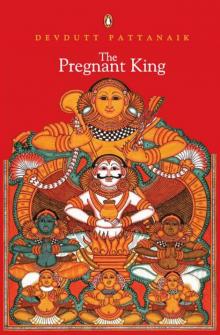 Pregnant King
Pregnant King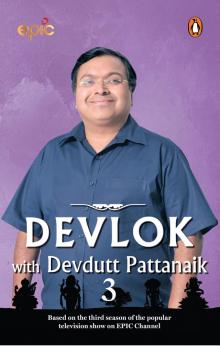 Devlok With Devdutt Pattanaik: 3
Devlok With Devdutt Pattanaik: 3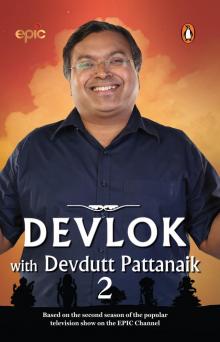 Devlok With Devdutt Pattanaik
Devlok With Devdutt Pattanaik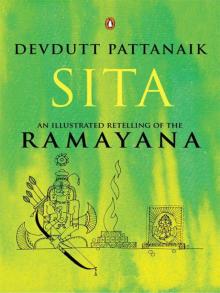 Sita: An Illustrated Retelling of the Ramayana
Sita: An Illustrated Retelling of the Ramayana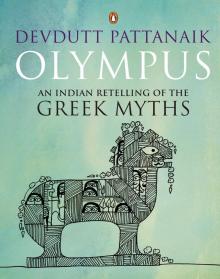 Olympus
Olympus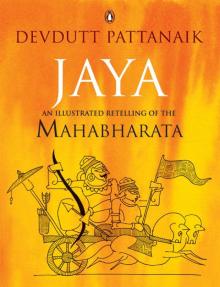 Jaya: An Illustrated Retelling of the Mahabharata
Jaya: An Illustrated Retelling of the Mahabharata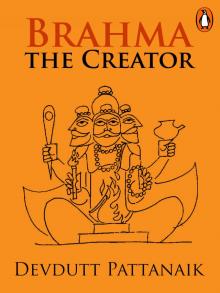 Brahma
Brahma